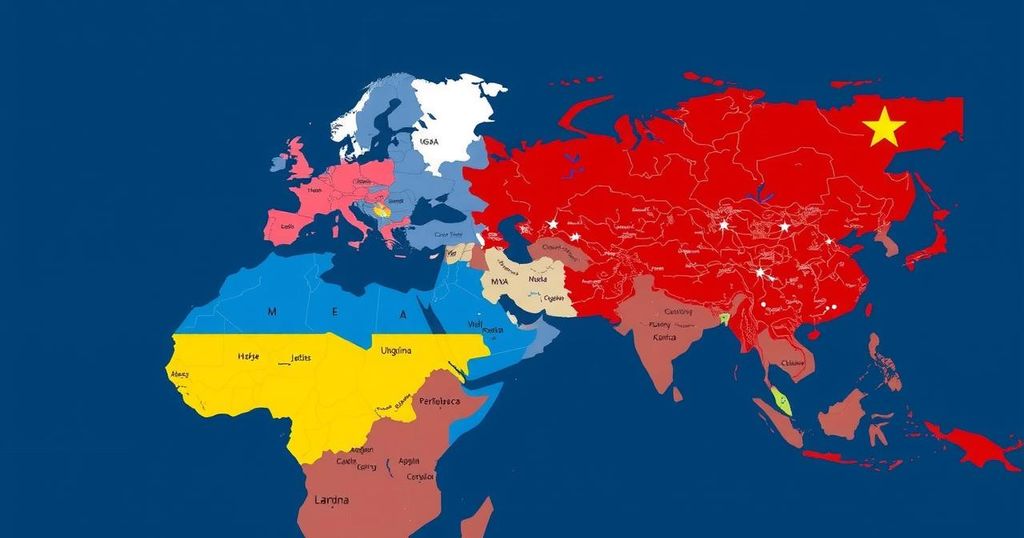Implications of Donald Trump’s Victory for Global Foreign Policy
Donald Trump’s election victory is likely to reshape U.S. foreign policy significantly, impacting relations with Ukraine, the Middle East, and China. His approach emphasizes non-interventionism and protectionism, raising concerns about NATO’s future, the stability of the Middle East, and the strategic trade relations with China. Stakeholders in these regions will need to adapt to these evolving dynamics.
The victory of Donald Trump in the recent elections is poised to significantly alter U.S. foreign policy across various global arenas, particularly in Ukraine, the Middle East, and China. Trump’s campaign rhetoric emphasized a pivot towards non-interventionism and trade protectionism under the banner of “America First,” foreshadowing a departure from traditional policies that have characterized U.S. diplomacy for decades. In relation to Ukraine, Trump has expressed optimism regarding a swift resolution to the ongoing conflict with Russia, suggesting that he could facilitate a peace agreement. His former national security advisers advocate for the continued supply of weaponry to Ukraine but under specific conditions linked to peace negotiations with Russia. Furthermore, Trump’s stance on NATO remains contentious; while he has previously questioned the alliance’s structure, it is uncertain whether he intends to withdraw the U.S. from NATO altogether. Turning to the Middle East, Trump has vowed to bring peace to the region, yet specifics remain scarce, particularly regarding the Israel-Hamas and Israel-Hezbollah conflicts. His previous administration’s approach to Iran and support for Israel established a contentious legacy, complicating any potential resolutions. It remains ambiguous how Trump will balance his support for Israel with the necessity for peace in Gaza, especially since his policies previously alienated Palestinian interests. Concerning China, Trump’s prior administration was characterized by a confrontational trade approach, viewing China as a strategic competitor. His plans may involve a shift away from building regional partnerships aimed at containing China, possibly reverting to unilateral tariffs and a confrontational stance. This approach aims to bolster domestic manufacturing while managing the strategic implications of China’s growing influence. In summary, Trump’s return to power signals a potential restructuring of U.S. foreign policy characterized by isolationism and protectionism on multiple fronts. Stakeholders in Ukraine, the Middle East, and China will need to navigate the uncertainties introduced by his victory, as America’s global role hangs in the balance between intervention and non-involvement.
The changing dynamics of U.S. foreign policy under Donald Trump’s potential leadership evoke discussions surrounding crucial global conflicts and international alliances. Trump’s previous administration showcased a blend of unconventional diplomacy and nationalist rhetoric, which shaped various international relationships. His approach prioritizes American interests, thereby challenging existing geopolitical norms. Policy shifts in the U.S. influence not only regional stability but also global power dynamics, requiring careful examination of past actions and future intentions.
In conclusion, Donald Trump’s electoral win heralds a shift in U.S. foreign policy that could reshape international relations significantly. His non-interventionist stance promises changes in the U.S. approach to the Ukraine crisis, Middle Eastern conflicts, and U.S.-China relations. How effectively Trump navigates these complex and volatile terrains while maintaining an ‘America First’ philosophy will be closely scrutinized by allies and adversaries alike. Stakeholders across these regions will need to prepare for a new era of U.S. diplomacy that prioritizes national interests, potentially at the expense of traditional alliance structures.
Original Source: www.bbc.com




Post Comment